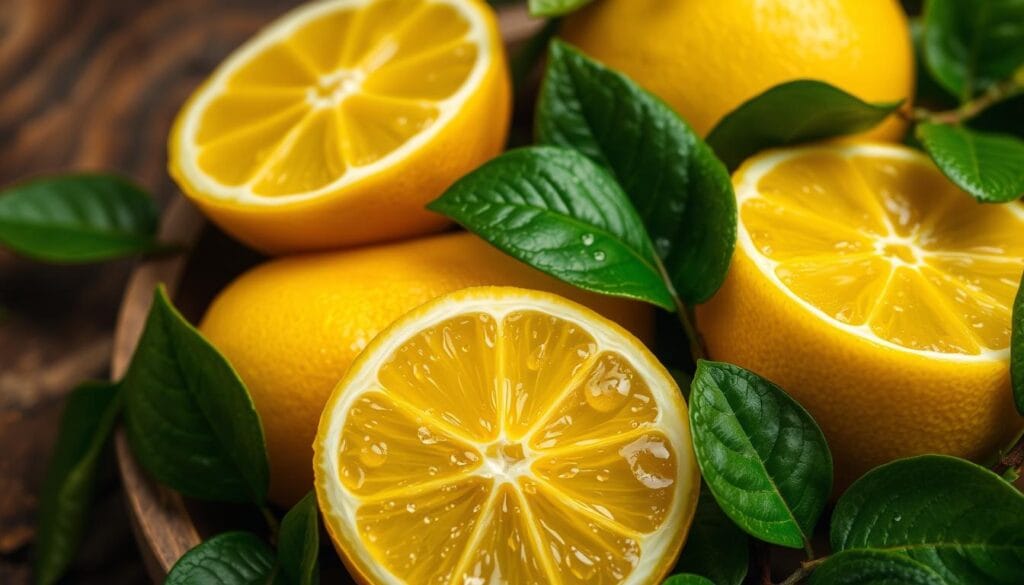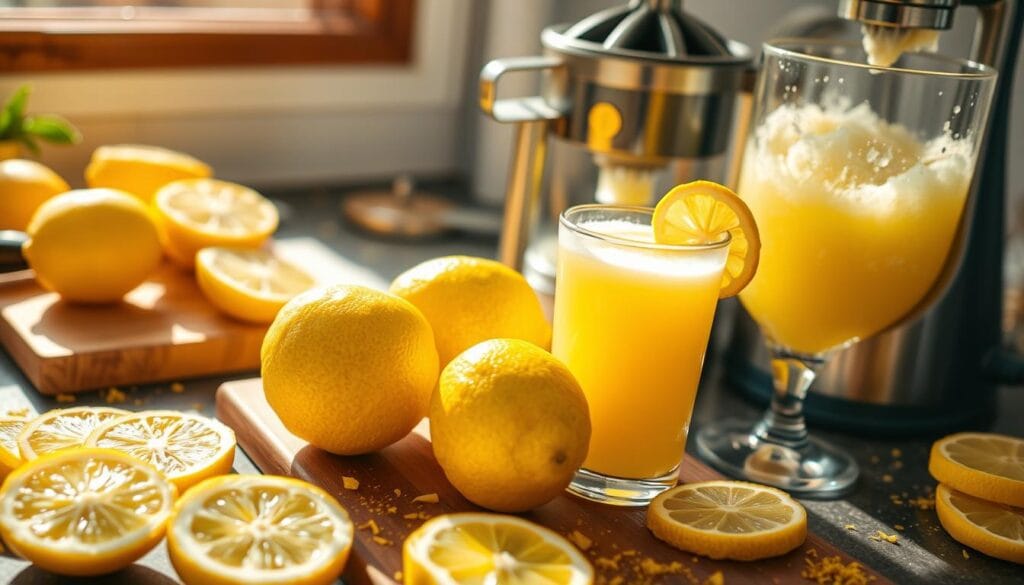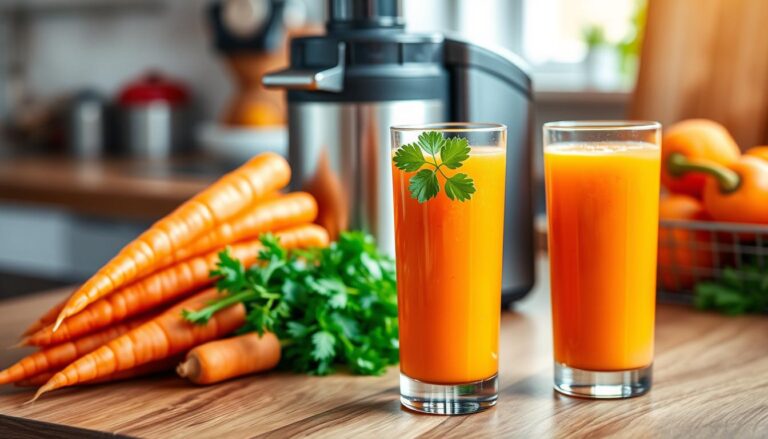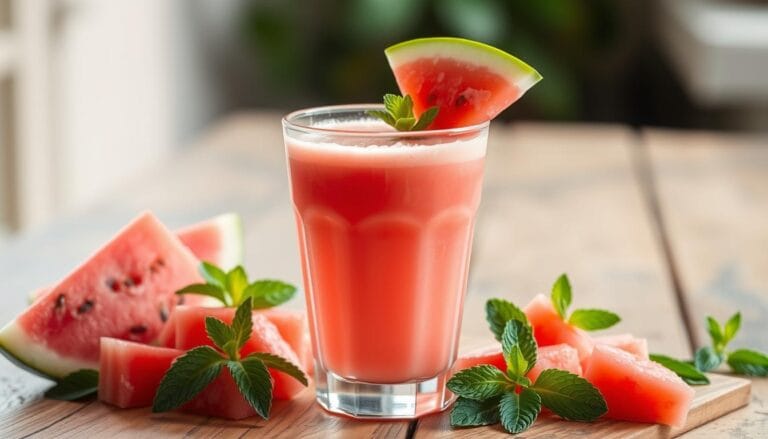Essential Guide: How Much Juice Is in One Lemon?
Ever thought about how much juice one lemon can give? Knowing the exact answer to ‘how much juice is in one lemon’ is key for cooking, baking, and making drinks. In this guide, we’ll reveal the secrets of lemon juice and share tips to get the most out of each lemon.

Table of Contents
Key Takeaways
- An average-sized lemon yields about 3 tablespoons of fresh juice.
- The juice amount can change based on lemon size, ripeness, and type.
- Knowing how much juice a lemon has is important for making recipes right and tasty dishes.
- Storing and keeping lemon juice fresh can make it last longer.
- Trying different ways to juice can help get the most juice from each lemon.
Understanding Lemon Juice Basics
Lemons are a versatile citrus fruit that offer a wealth of benefits beyond their distinct tart flavor. Fresh lemon juice is not only a culinary staple but also a powerhouse of nutritional value and health-promoting properties. Learning about lemon juice can help you use it to its fullest in your kitchen and for your health.
Health Benefits of Fresh Lemon Juice
Lemon juice is known for its high vitamin C content. A single medium-sized lemon can give you up to 20% of the daily vitamin C you need. Vitamin C is a strong antioxidant that boosts your immune system and helps your skin stay healthy. It also aids digestion, keeps you hydrated, and may even fight cancer.
Common Uses in Cooking and Beverages
Lemon juice is a versatile ingredient that can make many dishes and drinks better. It adds a bright, tangy flavor to salads, marinades, sauces, and baked goods. It’s also great in refreshing lemonades, cocktails, and mocktails. Plus, it’s used as a natural cleaner and for home remedies.
Nutritional Value of Lemons
Lemons are not just for their vitamin C. They also have dietary fiber, vitamin B6, potassium, and folate. Adding lemon juice to your diet can increase your nutrient intake and support your health.
| Nutrient | Amount in 1 Medium Lemon | % Daily Value |
|---|---|---|
| Vitamin C | 30.7 mg | 51% |
| Fiber | 2.0 g | 7% |
| Vitamin B6 | 0.1 mg | 4% |
| Potassium | 80 mg | 2% |
| Folate | 5 mcg | 1% |
“Lemons are a true gift from nature, offering an incredible array of benefits that extend far beyond their bright, tangy flavor.”
How Much Juice Is in One Lemon
Knowing how much juice a lemon has is key in cooking and baking. A medium-sized lemon usually has 2-3 tablespoons (30-45 milliliters) of juice. But, the amount can change based on the lemon’s size and ripeness.
Smaller lemons give 1-2 tablespoons of juice. Bigger lemons can have up to 4 tablespoons. Knowing this is important for recipes and figuring out how much juice you need.
“One regular-sized lemon contains about 2-3 tablespoons of juice.”
Many think one lemon is always 2 tablespoons of juice. But, the actual juice from one lemon can be between 1 to 4 tablespoons. This depends on the lemon’s size and type.
Knowing the average lemon juice yield helps you measure ingredients right. This ensures your dishes turn out well. By following these tips, you can use lemon juice correctly in your cooking and baking.
Factors Affecting Lemon Juice Yield
The amount of juice from a lemon can change a lot. Knowing what affects it can help you get more juice from your lemons.
Lemon Size and Varieties
Bigger lemons usually have more juice than smaller ones. A medium lemon can give you 2-3 tablespoons of juice. Small ones give 1-2, and big ones can give 3-4.
The type of lemon also matters. Meyer lemons are juicier than some others, like Eureka lemons.
Ripeness and Storage Conditions
How ripe a lemon is affects its juice. Ripe lemons are softer and give more juice. Unripe or overripe ones don’t.
Where you store your lemons also matters. Lemons at room temperature give more juice than those in the fridge.
Seasonal Variations
The season can also change how much juice you get. Lemons are juiciest from winter to early spring. Weather like temperature and sunlight affects their juiciness all year.
Knowing these things helps you get the most juice from your lemons. Use it for cooking, drinks, or anything else.
“The amount of juice you can extract from a lemon is influenced by various factors, including its size, variety, ripeness, and storage conditions.”
Professional Tips for Maximum Juice Extraction
Getting the most juice out of lemons is an art. It’s useful for making lemonade, adding zest to recipes, or getting lemon juice’s health benefits. These tips will help you squeeze every last drop from your lemons.
Start by rolling the lemon on a countertop before cutting. This breaks down the cells and releases more juice. Also, a quick 10-15 second microwave blast can soften the lemon, making it juicier.
For juicing, use tools like manual citrus juicers, electric juicers, or squeeze bottles. These tools are made to get every drop of lemon juice. This way, you get the most juice for your effort.
Temperature also plays a role in juice extraction. Lemons at room temperature yield more juice than cold ones. The warmth makes the lemon softer and easier to squeeze.
- Roll the lemon firmly on a countertop before cutting to break down cell walls
- Microwave the lemon for 10-15 seconds to further soften it
- Use specialized juicing tools like citrus juicers, electric juicers, or squeeze bottles
- Room temperature lemons typically yield more juice than cold ones
By using these lemon juicing techniques, you can get the most juice from every lemon. This unlocks their full juice extraction methods potential for cooking and health.

Lemon Juice Measurement Guide
Getting the right amount of lemon juice is key for great recipes. Whether using fresh lemons or bottled juice, knowing how to measure is crucial. It makes your cooking better.
Converting Fresh to Bottled Juice
When swapping bottled for fresh lemon juice, use the same amount. One medium lemon gives about 2-3 tablespoons or 1-2 ounces of juice. But, the exact amount can change based on lemon size, ripeness, and how you squeeze it.
Kitchen Tools for Accurate Measuring
- Measuring spoons: Essential for precisely measuring teaspoons and tablespoons of lemon juice.
- Measuring cups: Ideal for larger volumes, such as quarter, half, and full cups of lemon juice.
- Kitchen scale: Provides the most accurate measurement by weight, which can be helpful for recipes that call for precise lemon juice quantities.
Standard Recipe Conversions
When a recipe asks for lemon juice, you can use:
- Lime juice: Use a 1:1 ratio for fresh or bottled lime juice.
- Orange juice: Substitute at a 1.5:1 ratio, as orange juice is less tart than lemon.
- Grapefruit juice: Use a 2:1 ratio, as grapefruit juice is less acidic than lemon.
Keep in mind, these swaps can change your dish’s flavor. So, adjust to get the taste you want.
“Precise measurement is the key to consistent, balanced recipes. Understanding how to properly measure lemon juice can elevate your culinary skills and ensure your dishes shine.”
Storage and Preservation Methods
Keeping lemon juice fresh and potent is crucial. Whether you’ve just squeezed it or have some left over, the right storage can help. It keeps the juice fresh, flavorful, and full of nutrients.
Refrigerating Fresh Lemon Juice
For short-term storage, put freshly squeezed lemon juice in airtight containers in the fridge. It can last up to a week this way. Use it within 4-7 days for the best taste.
Freezing Lemon Juice
To keep lemon juice longer, freeze it in ice cube trays or small containers. Frozen lemon juice stays good for up to 6 months. Just thaw what you need when you’re ready. This is great for storing lemon juice and preserving fresh lemon juice for a long time.
Canning Lemon Juice
For even longer lemon juice shelf life, can it using a water bath canner. Heat the juice to kill bacteria and seal it in sterilized jars. Properly canned lemon juice can last 12-18 months.
| Storage Method | Shelf Life |
|---|---|
| Refrigerated Fresh Lemon Juice | 4-7 days |
| Frozen Lemon Juice | Up to 6 months |
| Canned Lemon Juice | 12-18 months |
Using these storage and preservation methods lets you enjoy lemon juice’s flavor and nutrients for a long time.
“Proper storage is the key to preserving the fresh taste and nutrients of lemon juice.”
Conclusion
Knowing how much juice a lemon has is key for using it in cooking. A medium lemon usually gives 2-3 tablespoons of juice. This makes lemon juice a great addition to many recipes.
Using the right methods to squeeze and store lemons can help you use them more. Lemon juice not only adds flavor but also boosts vitamin C. It’s a must-have in any kitchen.
Whether you’re making lemonades, adding zest to marinades, or baking with lemons, this lemon juice guide is here to help. It will show you how to use lemons in your cooking. This way, you can explore all the culinary lemon applications out there.
Source Links
- How Much Juice Is In One Lemon? Lemon Juice Explained – https://www.onegoodthingbyjillee.com/how-much-juice-in-a-lemon/
- How Much Juice Is in Citrus Fruits – https://www.webstaurantstore.com/blog/2760/juice-in-citrus-fruits.html?srsltid=AfmBOoqosIqV_aaYWM_3P84CL_GSpyr-mV_Ta714VIxNhhg6nuia9Fyf
- How to Juice a Lemon – https://feelgoodfoodie.net/recipe/how-to-juice-a-lemon/
- Best Homemade Lemonade Ever – https://www.allrecipes.com/recipe/32385/best-lemonade-ever/
- Make a Lemony Sugar Syrup for Cocktails, Lemonade, and More – https://www.thespruceeats.com/lemon-simple-syrup-4011997
- How Much Juice Is In One Lemon? – https://www.allrecipes.com/article/how-much-juice-is-in-one-lemon/
- How Much Juice Is in Citrus Fruits – https://www.webstaurantstore.com/blog/2760/juice-in-citrus-fruits.html?srsltid=AfmBOopauzKVidxX6A17QwtGopEV6_WgjZ7dqkwdCMMlo2_nqFY0eZO8
- How Much Juice Is in One Lemon? to Squeeze the Perfect Amount – https://mixmyjuice.com/how-much-juice-in-one-lemon/
- The Various Tips and Tricks To Get The Most Juice Out of Any Lemons You Might Buy – https://www.cookist.com/the-various-tips-and-tricks-to-get-the-most-juice-out-of-any-lemons-you-might-buy/
- How Much Juice In One Lemon? – https://nawon.com.vn/how-much-juice-in-one-lemon/?srsltid=AfmBOopQJDQ7kzvfEvCjJkugPWzea1vRvAcN43YBRSFhj1kP2YMBFccc
- 12 Tricks And Tips For Using A Juicer – Tasting Table – https://www.tastingtable.com/1563064/tips-tricks-use-juicer/
- How to Make Delicious Homemade Fruit Juice: Easy Juice Recipe – https://loyal-machine.com/blog/how-to-prepare-fruit-juice/
- How Much Juice Is Usually In One Lemon? – The Daily Meal – https://www.thedailymeal.com/1540662/how-much-juice-in-one-lemon/
- How to Juice a Lemon (6 Methods With + Without Juicer | + Freeze it) – https://www.alphafoodie.com/how-to-juice-a-lemon/
- 3 Ways to Make Lemon Juice – wikiHow – https://www.wikihow.com/Make-Lemon-Juice
- 5 Ways To Store Lemons So They Stay Fresh Longer – https://www.southernliving.com/food/fruits/citrus/lemon/how-to-store-lemons?srsltid=AfmBOoqnvemdieZFEB9lxSLHIuQF5_aYce5y04cBFkK1M0Zdi_Tw66d-
- How to Preserve Lemon Juice: 14 Steps (with Pictures) – wikiHow – https://www.wikihow.com/Preserve-Lemon-Juice
- Lemon | Definition, Nutrition, Uses, & Facts | Britannica – https://www.britannica.com/plant/lemon
- The Effect of Lemon Juice (Citrus limon L.) Treated with Melatonin on the Health Status and Treatment of K14HPV16 Mice – https://pmc.ncbi.nlm.nih.gov/articles/PMC11117883/







